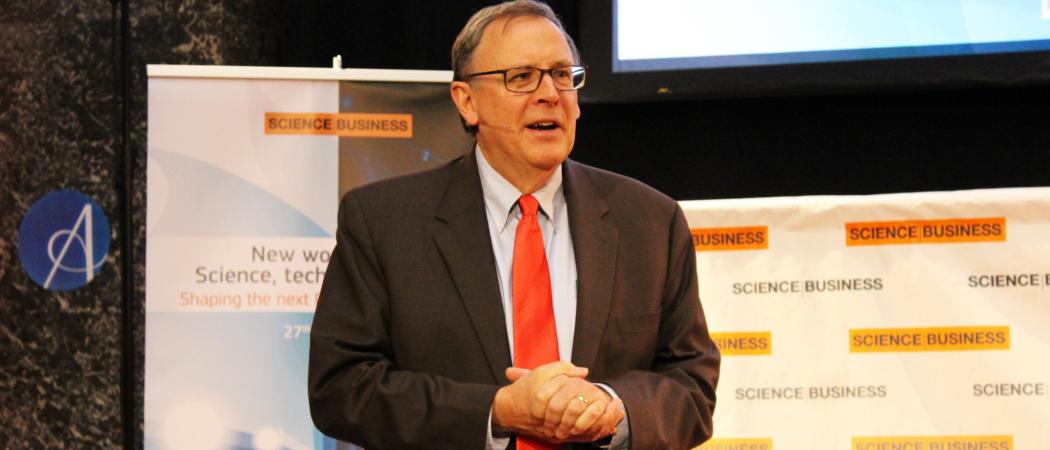French President would give science and technology the biggest role in Europe’s future since the 1960s

Richard Hudson, Editor-in-chief & Vice Chair of the Board of Science|Business
BRUSSELS – In his speech Tuesday on Europe’s future, French President Emmanuel Macron harkened back to the 1950s and the Franco-German founding of post-war Europe, saying, “The time when France proposes is back.” For those interested in science, education and technology policy, that is a message they should greet with joy.
The speech had lots of grand ideas: A new European agency for innovative disruption, a European diploma, a broadening of the Erasmus exchange programme to all young people regardless of degree. In the aftermath, we have heard much grumbling from policy experts that Macron’s ideas are either too bold or too old. Maybe. We don’t know enough about the details yet to judge (the French bureaucracy is, itself, having a hard time keeping up with the President’s flood of ideas.)
But the specifics don’t matter. What counts is the message: That knowledge is at the core of what defines Europe, and unites it; that science can help solve our problems; that education can lift people; and that technology, far from being something to fear in globalisation, can be Europe’s competitive edge in the world.
In short, for the first time in 50 years, a heavy-weight European leader is a techno-optimist: knowledge counts.
The power of ideas
Deliberately, Macron spoke from one of the world’s oldest and most famous universities.
“To come and speak at the Sorbonne … means a lot. We are all aware of the prestige of this hall. But the Sorbonne is not about this prestigious building. It’s about an idea, an idea carried forth by some scholars and their students who built their future seated on straw.
“Europe is also an idea, an idea borne for centuries by pioneers, optimists, visionaries and, in order that it not end, is up to us to carry forward.”
That kind of high language is rare from any of our leaders in these days of 140-character Tweet storms, online race-baiting and Facebook hate-advertising. By force of rhetoric alone, it can help move Europe’s political conversation past the disappointing German election results of Sunday.
But it also brings us back to an earlier time, when technology was widely viewed as a force for progress. The 1960s, despite social and political turmoil as deep as ours today, was also the decade of Concorde, nuclear power, the Apollo mission, colour television and household appliances. It was in 1963 that another charismatic leader, Harold Wilson, delivered his famous ‘white heat of technology’ speech (now often misquoted). “We are re-defining and we are re-stating our socialism in terms of the scientific revolution,” Wilson told a Labour Party conference. A new Britain “will be forged in the white heat of that revolution.”
What the polls say
Macron’s speech is on the same historic plane. That he should so forcefully express his techno-optimism further demonstrates his political courage – because any pollster can, and probably did, warn him that technology is a tricky issue.
While we like our antibiotics, smartphones and airplanes, we fear unemployment and globalisation. A 2014 Eurobarometer survey charted the complexity. While 65 per cent of Europeans surveyed thought science and technology would make things better in 15 years for their health, they were not so optimistic about the impact on other domains (54 per cent thought it would help climate change, and 50 per cent, housing.) The Nordic countries, Ireland, Malta and Spain are optimists. Austrians, Germans, Greeks and Italians are pessimists. France is middling.
And that is exactly why Macron’s speech is important. It asserts the positive, identifying knowledge as one of the key attributes that will unite, rather than divide, Europe. For anybody who thinks money for education, research and innovation is important – whether in Brussels, Paris or Bucharest – this is succor. For anybody who wants a more forward-leaning set of industrial, trade and social policies, this is unexpected support from a nation whose political class more often looks back than forward.
So for us, we will look at the details of Macron’s plans with huge interest. But we will not let the fine print blind us to the extraordinary opportunity that his rhetorical master-stroke affords us. He has reshaped the political game board for education, science and technology. It is up to others now to make the next move.





 A unique international forum for public research organisations and companies to connect their external engagement with strategic interests around their R&D system.
A unique international forum for public research organisations and companies to connect their external engagement with strategic interests around their R&D system.